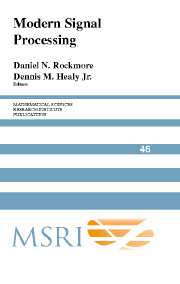Book contents
- Frontmatter
- Contents
- Introduction: A New Generation of Signal Processing
- Hyperbolic Geometry, Nehari's Theorem, Electric Circuits, and Analog Signal Processing
- Engineering Applications of the Motion-Group Fourier Transform
- Fast X-Ray and Beamlet Transforms for Three-Dimensional Data
- Fourier Analysis and Phylogenetic Trees
- Diffuse Tomography as a Source of Challenging Nonlinear Inverse Problems for a General Class of Networks
- An Invitation to Matrix-Valued Spherical Functions: Linearization of Products in the Case of Complex Projective Space P2(ℂ)
- Image Registration for MRI
- Image Compression: The Mathematics of JPEG 2000
- Integrated Sensing and Processing for Statistical Pattern Recognition
- Sampling of Functions and Sections for Compact Groups
- The Cooley-Tukey FFT and Group Theory
- Signal Processing in Optical Fibers
- The Generalized Spike Process, Sparsity, and Statistical Independence
Sampling of Functions and Sections for Compact Groups
Published online by Cambridge University Press: 25 June 2025
- Frontmatter
- Contents
- Introduction: A New Generation of Signal Processing
- Hyperbolic Geometry, Nehari's Theorem, Electric Circuits, and Analog Signal Processing
- Engineering Applications of the Motion-Group Fourier Transform
- Fast X-Ray and Beamlet Transforms for Three-Dimensional Data
- Fourier Analysis and Phylogenetic Trees
- Diffuse Tomography as a Source of Challenging Nonlinear Inverse Problems for a General Class of Networks
- An Invitation to Matrix-Valued Spherical Functions: Linearization of Products in the Case of Complex Projective Space P2(ℂ)
- Image Registration for MRI
- Image Compression: The Mathematics of JPEG 2000
- Integrated Sensing and Processing for Statistical Pattern Recognition
- Sampling of Functions and Sections for Compact Groups
- The Cooley-Tukey FFT and Group Theory
- Signal Processing in Optical Fibers
- The Generalized Spike Process, Sparsity, and Statistical Independence
Summary
In this paper we investigate quadrature rules for functions on compact Lie groups and sections of homogeneous vector bundles associated with these groups. First a general notion of band-limitedness is introduced which generalizes the usual notion on the torus or translation groups. We develop a sampling theorem that allows exact computation of the Fourier expansion of a band-limited function or section from sample values and quantifies the error in the expansion when the function or section is not band-limited. We then construct specific finitely supported distributions on the classical groups which have nice error properties and can also be used to develop efficient algorithms for the computation of Fourier transforms on these groups.
1. Introduction
The Fourier transform of a function on a compact Lie group computes the coefficients (Fourier coefficients) that enable its expression as a linear combination of the matrix elements from a complete set of irreducible representations of the group. In the case of abelian groups, especially the circle and its lower dimensional products (tori) this is precisely the expansion of a function on these domains in terms of complex exponentials. This representation is at the heart of classical signal and image processing (see [25; 26], for example).
The successes of abelian Fourier analysis are many, ranging from national defense to personal entertainment, from medicine to finance. The record of achievements is so impressive that it has perhaps sometimes led scientists astray, seducing them to look for ways to use these tools in situations where they are less than appropriate: for example, pretending that a sphere is a torus so as to avoid the use of spherical harmonics in favor of Fourier series - a favored mathematical hammer casting the multitudinous problems of science as a box of nails.
Information
- Type
- Chapter
- Information
- Modern Signal Processing , pp. 247 - 280Publisher: Cambridge University PressPrint publication year: 2004
